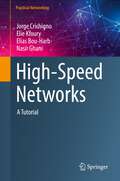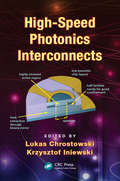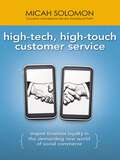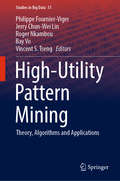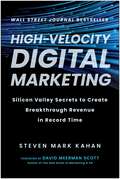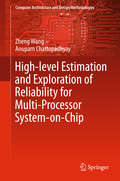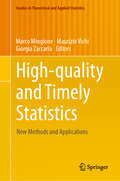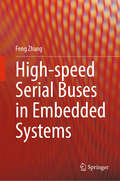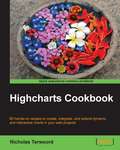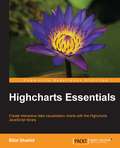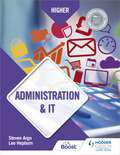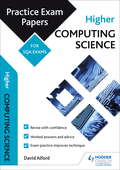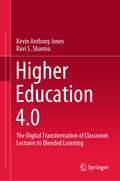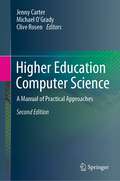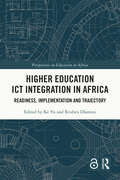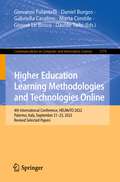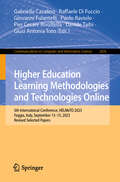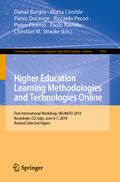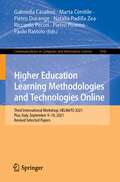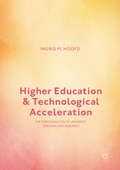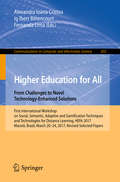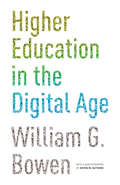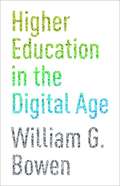- Table View
- List View
High-Speed Networks: A Tutorial (Practical Networking)
by Elias Bou-Harb Jorge Crichigno Elie Kfoury Nasir GhaniThis book provides practical knowledge and skills on high-speed networks, emphasizing on Science Demilitarized Zones (Science DMZs). The Science DMZ is a high-speed network designed to facilitate the transfer of big science data which is presented in this book. These networks are increasingly important, as large data sets are now often transferred across sites. This book starts by describing the limitations of general-purpose networks which are designed for transferring basic data but face numerous challenges when transferring terabyte- and petabyte-scale data. This book follows a bottom-up approach by presenting an overview of Science DMZs and how they overcome the limitations of general-purpose networks. It also covers topics that have considerable impact on the performance of large data transfers at all layers: link layer (layer-2) and network layer (layer-3) topics such as maximum transmission unit (MTU), switch architectures, and router’s buffer size; transport layer (layer-4) topics including TCP features, congestion control algorithms for high-throughput high-latency networks, flow control, and pacing; applications (layer-5) used for large data transfers and for maintenance and operation of Science DMZs; and security considerations. Most chapters incorporate virtual laboratory experiments, which are conducted using network appliances running real protocol stacks. Students in computer science, information technology and similar programs, who are interested in learning fundamental concepts related to high-speed networks and corresponding implementations will find this book useful as a textbook. This book assumes minimal familiarity with networking, typically covered in an introductory networking course. It is appropriate for an upper-level undergraduate course and for a first-year graduate course. Industry professionals working in this field will also want to purchase this book.
High-Speed Photonics Interconnects (Devices, Circuits, and Systems #13)
by Krzysztof Iniewski Lukas ChrostowskiDramatic increases in processing power have rapidly scaled on-chip aggregate bandwidths into the Tb/s range. This necessitates a corresponding increase in the amount of data communicated between chips, so as not to limit overall system performance. To meet the increasing demand for interchip communication bandwidth, researchers are investigating the use of high-speed optical interconnect architectures. Unlike their electrical counterparts, optical interconnects offer high bandwidth and negligible frequency-dependent loss, making possible per-channel data rates of more than 10 Gb/s. High-Speed Photonics Interconnects explores some of the groundbreaking technologies and applications that are based on photonics interconnects. From the Evolution of High-Speed I/O Circuits to the Latest in Photonics Interconnects Packaging and Lasers Featuring contributions by experts from academia and industry, the book brings together in one volume cutting-edge research on various aspects of high-speed photonics interconnects. Contributors delve into a wide range of technologies, from the evolution of high-speed input/output (I/O) circuits to recent trends in photonics interconnects packaging. The book discusses the challenges associated with scaling I/O data rates and current design techniques. It also describes the major high-speed components, channel properties, and performance metrics. The book exposes readers to a myriad of applications enabled by photonics interconnects technology. Learn about Optical Interconnect Technologies Suitable for High-Density Integration with CMOS Chips This richly illustrated work details how optical interchip communication links have the potential to fully leverage increased data rates provided through complementary metal-oxide semiconductor (CMOS) technology scaling at suitable power-efficiency levels. Keeping the mathematics to a minimum, it gives engineers, researchers, graduate students, and entrepreneurs a comprehensive overview of the dynamic landscape of high-speed photonics interconnects.
High-Tech, High-Touch Customer Service: Inspire Timeless Loyalty in the Demanding New World of Social Commerce
by Micah SolomonToday's customers are a hard bunch to crack. Time-strapped, screen-addicted, value-savvy, and socially engaged, their expectations are tougher than ever for a business to keep up with. They are empowered like never before and expect businesses to respect that sense of empowermentùlashing out at those that don't. Take heart: Old-fashioned customer service, fully retooled for today's blistering pace and digitally connected reality, is what you need to build the kind loyal customer base that allows you to surviveùand thrive. And High-Tech, High-Touch Customer Service spells out surefire strategies for success in a clear, entertaining, and practical way. Discover: ò Six major customer trends and what they mean for your business ò Eight unbreakable rules for social media customer service ò How to effectively address online complainers and saboteurs on Yelp, Twitter, TripAdvisor, and other forums for user generated content ò The rising power of self-serviceùand how to design it properly ò How to build a company culture that breeds stellar customer service High-Tech, High-Touch Customer Service reveals inside secrets of wildly successful customer service initiatives, from Internet startups to venerable brands, and shows how companies of every stripe can turn casual customers into fervent supporters who will spread the word far and wideùonline and off.
High-Throughput Metabolomics: Methods and Protocols (Methods in Molecular Biology #1978)
by Angelo D'AlessandroThis detailed volume focuses on recent technological, computational, and biostatistical advances in the field of high-throughput metabolomics. Chapters encompass methods, platforms, and analytical strategies for steady state measurements and metabolic flux analysis with stable isotope-labeled tracers, in biological matrices of clinical relevance and model organisms. Mass spectrometry-based or orthogonal methods are discussed, along with computational and statistical methods to address data sparsity in high-throughput metabolomics approaches. As a part of the highly successful Methods in Molecular Biology series, chapters include introductions to their respective topics, lists of the necessary materials and reagents, step-by-step, readily reproducible laboratory protocols, and tips on troubleshooting and avoiding known pitfalls. Authoritative and practical, High-Throughput Metabolomics: Methods and Protocols provides tools that can bring about the next generation of clinical biochemistry in a cost-effective, rigorous fashion, exponentially advancing our capacity to investigate nature while hastening the advent of personalized medicine.
High-Utility Pattern Mining: Theory, Algorithms and Applications (Studies in Big Data #51)
by Vincent S. Tseng Jerry Chun-Wei Lin Roger Nkambou Philippe Fournier-Viger Bay VoThis book presents an overview of techniques for discovering high-utility patterns (patterns with a high importance) in data. It introduces the main types of high-utility patterns, as well as the theory and core algorithms for high-utility pattern mining, and describes recent advances, applications, open-source software, and research opportunities. It also discusses several types of discrete data, including customer transaction data and sequential data.The book consists of twelve chapters, seven of which are surveys presenting the main subfields of high-utility pattern mining, including itemset mining, sequential pattern mining, big data pattern mining, metaheuristic-based approaches, privacy-preserving pattern mining, and pattern visualization. The remaining five chapters describe key techniques and applications, such as discovering concise representations and regular patterns.
High-Velocity Digital Marketing: Silicon Valley Secrets to Create Breakthrough Revenue in Record Time
by Steven Mark KahanHigh-Velocity Digital Marketing provides B2B sales and marketing teams with a blueprint for quickly accelerating revenue growth 67 percent of B2B buyers no longer prefer to interact with sales representatives when making purchasing decisions. Gathering information online is now the hallmark of the buying process. During his 30+ year career, Steven Mark Kahan has developed a digital marketing blueprint that helps companies quickly increase revenue in brutally competitive markets. In High-Velocity Digital Marketing, he lays out how you can: Set in motion a modern marketing strategy to dramatically increase revenue growth in record time Create content that resonates with your ideal target customers Drive more visitors to your website without paying for ads Build digital demand generation campaigns that quickly deliver more leads, sales pipeline, and revenue Improve your website to convert at least 5 percent of traffic to leads Leverage public relations so it contributes to revenue growth Synchronize your sales and marketing teams in order to close prospects faster and at a higher rate Marketing online is no longer one of the ways to market—it is the way to do marketing. High-Velocity Digital Marketing is your essential, easy-to-implement guide to getting found online, providing the most critical information, and getting your buyers to purchase—fast.
High-level Estimation and Exploration of Reliability for Multi-Processor System-on-Chip
by Zheng Wang Anupam ChattopadhyayThis book introduces a novel framework for accurately modeling the errors in nanoscale technology and developing a smooth tool flow at high-level design abstractions to estimate error effects, which aids the development of high-level fault-tolerant techniques. In total, the book presents 6 solutions for reliability estimation (3 for fault injection and 3 for analytical estimation) and 5 techniques for reliability exploration (3 for architectural level and 2 for system-level). It also presents a survey of state-of-the-art problems and solutions, offering insights into reliability issues in digital design and their cross-layer countermeasures.
High-quality and Timely Statistics: New Methods and Applications (Studies in Theoretical and Applied Statistics)
by Maurizio Vichi Marco Mingione Giorgia ZaccariaThis book addresses a wide range of recent methodological aspects, applications and best practices of statistics production. It comprises a selection of peer-reviewed contributions of methodological and applied interest presented at the 4th Conference of European Statistics Stakeholders, CESS 2022, held in Rome, Italy, on October 20-21, 2022. The first part discusses statistical methods with applications to environmental risk assessment, sentinels data, surveillance systems during the Covid-19 pandemic, healthcare risk management, the analysis of regional or structural changes of scale, household distributional accounts, regional rental prices on municipalities, the network topology of the Euro area interbank market, tourism statistics and big data, statistical literacy, and Sustainable Development Goal composite indicators for EU countries. The second part focuses on statistical methodologies for complex data analysis, namely the optimal number of clusters to rank a model-based index, clustering methods for asymmetric data using spectral approaches, a family of parsimonious matrix-variate mixture models for heavy-tailed data, the importance of robust second-stage regressions for financial data, and on perturbation methods. In view of the overarching theme “The European Data Ecosystem for the Statistical Information of the Digital Age” and the importance of statistical data for monitoring the progress of the United Nations’ Sustainable Development Goals, the CESS 2022 meeting provided a forum for discussion on methodologies, results, challenges and best practices among methodologists, producers, and users of European Statistics from academia, the national statistical offices and the institutions of the European Union. Chapter Estimating regional rental prices on LAU 2 municipalities in North Rhine-Westphalia is available open access under a Creative Commons Attribution 4.0 International License via link.springer.com.
High-speed Serial Buses in Embedded Systems
by Feng ZhangThis book describes the most frequently used high-speed serial buses in embedded systems, especially those used by FPGAs. These buses employ SerDes, JESD204, SRIO, PCIE, Aurora and SATA protocols for chip-to-chip and board-to-board communication, and CPCIE, VPX, FC and Infiniband protocols for inter-chassis communication. For each type, the book provides the bus history and version info, while also assessing its advantages and limitations. Furthermore, it offers a detailed guide to implementing these buses in FPGA design, from the physical layer and link synchronization to the frame format and application command. Given its scope, the book offers a valuable resource for researchers, R&D engineers and graduate students in computer science or electronics who wish to learn the protocol principles, structures and applications of high-speed serial buses.
Highcharts Cookbook
by Nicholas TerwoordAn easy-to-follow, step-by-step guide with over 80 recipes covering examples on how to use and create dynamic charts with Highcharts. "Highcharts Cookbook" is intended for JavaScript developers or other web programmers looking to add charting functionality to their web applications. Some familiarity with web application development would be helpful but is not required.
Highcharts Essentials
by Bilal ShahidIf you are a web developer with a basic knowledge of HTML, CSS, and JavaScript and want to quickly get started with this web charting technology, this is the book for you. This book will also serve as an essential guide to those who have probably used a similar library and are now looking at migrating to Highcharts.
Higher Administration & IT
by Steven Argo Lee HepburnTrust our authors - whose students have achieved 100% A-C grades in Higher Admin since 2018 - to build your confidence and boost your grade.Easy to understand and enjoyable to read, this textbook takes you through all the theoretical content and practical skills, with over 60 accompanying digital tasks provided free online.> Learn and remember every topic. Simple explanations ensure that you have strong knowledge of administrative theory. Real-life case studies with differentiated exam-style questions help to check understanding before you move on.> Gain skills for the future. Digital literacy, organisational and management skills are developed throughout the course. The authors also focus on problem-solving skills, to set you up for success in the workplace.> Put skills into practice. Follow clear, step-by-step guides to using spreadsheets, databases, word processing, presentations, emails and e-diary. Apply your skills to over 60 digital tasks, which are available free online.> Prepare for assessment. 'What you should know' checklists and study activities at the end of each chapter are useful revision tools. A practice exam paper and answers are included in the book, and a practice assignment is provided online, with a full marking scheme.
Higher Administration & IT
by Steven Argo Lee HepburnTrust our authors - whose students have achieved 100% A-C grades in Higher Admin since 2018 - to build your confidence and boost your grade.Easy to understand and enjoyable to read, this textbook takes you through all the theoretical content and practical skills, with over 60 accompanying digital tasks provided free online.> Learn and remember every topic. Simple explanations ensure that you have strong knowledge of administrative theory. Real-life case studies with differentiated exam-style questions help to check understanding before you move on.> Gain skills for the future. Digital literacy, organisational and management skills are developed throughout the course. The authors also focus on problem-solving skills, to set you up for success in the workplace.> Put skills into practice. Follow clear, step-by-step guides to using spreadsheets, databases, word processing, presentations, emails and e-diary. Apply your skills to over 60 digital tasks, which are available free online.> Prepare for assessment. 'What you should know' checklists and study activities at the end of each chapter are useful revision tools. A practice exam paper and answers are included in the book, and a practice assignment is provided online, with a full marking scheme.
Higher Computing Science: HCOMPPEP
by David AlfordPractise for your SQA exams with three specially-commissioned Hodder Gibson Practice Exam Papers.- Practise with model papers written and checked by experienced markers and examiners- Get extra advice with specially-written study-skills guidance sections- Gain vital extra marks and avoid common mistakes with examiner tips
Higher Education 4.0: The Digital Transformation of Classroom Lectures to Blended Learning
by Kevin Anthony Jones Sharma RavishankarThis book chronicles a 10-year introduction of blended learning into the delivery at a leading technological university, with a longstanding tradition of technology-enabled teaching and learning, and state-of-the-art infrastructure. Hence, both teachers and students were familiar with the idea of online courses. Despite this, the longitudinal experiment did not proceed as expected. Though few technical problems, it required behavioural changes from teachers and learners, thus unearthing a host of socio-technical issues, challenges, and conundrums. With the undercurrent of design ideals such as “tech for good”, any industrial sector must examine whether digital platforms are credible substitutes or at best complementary. In this era of Industry 4.0, higher education, like any other industry, should not be about the creative destruction of what we value in universities, but their digital transformation. The book concludes with an agenda for large, repeatable Randomised Controlled Trials (RCTs) to validate digital platforms that could fulfil the aspirations of the key stakeholder groups – students, faculty, and regulators as well as delving into the role of Massive Open Online Courses (MOOCs) as surrogates for “fees-free” higher education and whether the design of such a HiEd 4.0 platform is even a credible proposition. Specifically, the book examines the data-driven evidence within a design-based research methodology to present outcomes of two alternative instructional designs evaluated – traditional lecturing and blended learning. Based on the research findings and statistical analysis, it concludes that the inexorable shift to online delivery of education must be guided by informed educational management and innovation.
Higher Education Computer Science: A Manual of Practical Approaches
by Jenny Carter Michael O’Grady Clive RosenThe march towards on-line and blended teaching—present before the Covid-19 pandemic—has been accelerated by it, and there is no going back. Students and staff may object, but the economic drive towards “greater productivity” will inevitably result in less face-to-face (f2f) instruction. Therefore, it is incumbent for those delivering this precious, in-person resource to make maximum use of time…which raises the question, “how”?The second edition of Higher Education Computer Science offers some potential answers. It also addresses other questions, such as “why have f2f teaching at all?” “what is the purpose of f2f?” and “what is the appropriate balance between the two?” The first edition began to offer suggestions for optimising limited opportunities to get together with students. Aligned with that, this unique new volume examines how to use the technology available to maximum advantage: For example, resources such as Moocs and other on-line instructional materials can provide invaluable pedagogic support. In addition, the book addresses ‘problem-based learning,’ using robotics in the teaching of programming, and a multidisciplinary approach to data science. Although it includes a chapter on distance learning, there is greater emphasis placed on the soft, transferable skills and employability skills that are best delivered in person. Further, the work provides several examples of putting theory into practice when teaching computer science at both undergraduate and postgraduate levels. Written by experienced practitioners, each chapter tackles a particular teaching activity or topic within computing, presented in such a way that other practitioners can use. As such, this new volume will be an invaluable resource to those who want to protect and optimise in-person teaching.
Higher Education ICT Integration in Africa: Readiness, Implementation and Trajectory (ISSN)
by Ke Yu Reuben DlaminiThis multidisciplinary, edited volume examines higher educations’ ICT integration in Africa, contributing a new and inclusive change readiness framework to better understand how to manage ICT or other technological disruptions in resource-restrained contexts.Tackling ICT incorporation in HEIs from different levels, chapters document case studies from countries such as Uganda, South Africa, Rwanda, Eswatini and Zimbabwe to demonstrate both the complexity of integration but also the successes it has enabled and under which conditions. The cases included in this book also exhibit better incorporation of both change content and process, while some cases also make explicit reference to other technology adoption models. Ultimately, the book highlights conceptual and empirical research to inform practices and policy development in Africa, improving multi-level success or change readiness in ICT incorporation in HEIs in Africa.Addressing various gaps in existing literature and proposing innovative solutions like the multilevel change readiness model, this book will therefore be of interest to scholars, researchers and academics in the fields of higher education, ICT integration, and educational technology more broadly.The Open Access version of this book, available at http://www.taylorfrancis.com, has been made available under a Creative Commons Attribution-Non Commercial-No Derivatives (CC-BY-NC-ND) 4.0 license.
Higher Education Learning Methodologies and Technologies Online: 4th International Conference, HELMeTO 2022, Palermo, Italy, September 21–23, 2022, Revised Selected Papers (Communications in Computer and Information Science #1779)
by Daniel Burgos Marta Cimitile Davide Taibi Gabriella Casalino Giovanni Fulantelli Giosuè Lo BoscoThis book constitutes the thoroughly refereed post-conference proceedings of the 4th International Conference on Higher Education Learning Methodologies and Technologies Online, HELMeTO 2022, held in Palermo, Italy, in September 2022. The 59 revised papers presented were carefully reviewed and selected from a total of 126 submissions. The papers present recent research on challenges of implementing emerging technology solution for online, online learning pedagogical frameworks, online learning technologies in practice, online learning strategies and resources, etc.
Higher Education Learning Methodologies and Technologies Online: 5th International Conference, HELMeTO 2023, Foggia, Italy, September 13–15, 2023, Revised Selected Papers (Communications in Computer and Information Science #2076)
by Paolo Raviolo Davide Taibi Gabriella Casalino Raffaele Di Fuccio Giusi Antonia Toto Giovanni Fulantelli Pier Cesare RivoltellaThis volume constitutes the refereed proceedings of the 5th International Workshop, HELMeTO 2023, held in Foggia, Italy, during September 13–15, 2023. The 52 full papers were carefully reviewed and selected from 107 submission. They are categorized in the following sections: Online pedagogy and learning methodologies and Learning technologies data analytics and educational big data mining and their applications, Smart Systems for Context-aware Education, Emotions and Art in Higher Distance Education and Performing art based methodology to improve online learning experiences, E learning for providing augmented mathematics education at University level, SuperCyberKids the importance of promoting Cybersecurity Education among teacher education students, Effects of High performance Artificial Intelligence systems and Immersive Technologies in Education, The Future of Learning Exploring the Intersection of Posthumanism E Health Technologies and Artificial Intelligence in Education Innovations, Technology based learning interventions in higher education for combating inequalities and increasing the psychological well being of youngsters, Innovative Inclusive University, Beyond borders: exploring immersive environments and new didactic approaches in higher education, Learning Technologies and Faculty Development in the digital framework.
Higher Education Learning Methodologies and Technologies Online: First International Workshop, HELMeTO 2019, Novedrate, CO, Italy, June 6-7, 2019, Revised Selected Papers (Communications in Computer and Information Science #1091)
by Daniel Burgos Riccardo Pecori Marta Cimitile Pietro Ducange Pietro Picerno Paolo Raviolo Christian M. StrackeThis book constitutes the thoroughly refereed post-conference proceedings of the First International Workshop on Higher Education Learning Methodologies and Technologies Online, HELMeTO 2019, held in Novedrate, Italy, in June 2019. The 15 revised full papers and 2 short papers presented were carefully reviewed and selected from a total of 39 submissions. The papers are organized in topical sections on online pedagogy and learning methodologies; learning technologies, data analytics and educational big data mining as well as their applications; the challenge of online sport and exercise sciences university programs.
Higher Education Learning Methodologies and Technologies Online: Third International Workshop, HELMeTO 2021, Pisa, Italy, September 9–10, 2021, Revised Selected Papers (Communications in Computer and Information Science #1542)
by Riccardo Pecori Marta Cimitile Pietro Ducange Pietro Picerno Paolo Raviolo Gabriella Casalino Natalia Padilla ZeaThis book constitutes the thoroughly refereed post-conference proceedings of the Third International Workshop on Higher Education Learning Methodologies and Technologies Online, HELMeTO 2021, held in Pisa, Italy, in September 2021. Due to the COVID-19 pandemic the conference was held online. The 26 revised full papers and 3 short papers presented were carefully reviewed and selected from a total of 65 submissions. The papers present recent research on challenges of implementing emerging technology solution for online, online learning pedagogical frameworks, facing COVID19 emergency in higher education teaching and learning, online learning technologies in practice, online learning strategies and resources, etc.
Higher Education and Technological Acceleration: The Disintegration of University Teaching and Research
by Ingrid M. HoofdThis book critically examines the relationship between new media technologies, research ethics, and pedagogical strategies within the contemporary university. It debates whether recent transformations of higher education, rather than an effect of neo-liberalization, are actually an outflow of the technological acceleration of the university's own contradictory ideals around knowledge and democracy. The book sets up this argument by likening the university to a "vision machine" which quest for total scientific and social transparency has recently caved in on itself, negatively affecting staff and student well-being. The book asserts that this situation reveals the essential tension at the heart of the university system, and explores the acceleration of this tension by analyzing a variety of teaching and research advances from Europe and Asia. Examining among other issues the call for creativity and critical thinking in the curriculum, the push for e-learning, and the advent of the digital humanities, this text offers a key analysis of the university's founding ideals and its constitutive relationship to technological acceleration.
Higher Education for All. From Challenges to Novel Technology-Enhanced Solutions: First International Workshop On Social, Semantic, Adaptive And Gamification Techniques And Technologies For Distance Learning, Hefa 2017, Maceió, Brazil, March 20-24, 2017, Revised Selected Papers (Communications In Computer And Information Science #832)
by Alexandra Ioana Cristea Ig Ibert Bittencourt Fernanda LimaThis book constitutes the thoroughly refereed proceedings of the Researcher Links Workshop: Higher Education for All, held in Maceió, Brazil, in March 2017. The 12 full papers presented were carefully reviewed and selected from 31 submissions. The papers deal with a large spectrum of topics, including higher education, technology-enhanced solutions, user modelling, user grouping, gamification, educational games, MOOCs, e-learning, open educational resources, collaborative learning, student modelling, serious games, language analysis.
Higher Education in the Digital Age
by William G. Bowen Kevin M. GuthrieTwo of the most visible and important trends in higher education today are its exploding costs and the rapid expansion of online learning. Could the growth in online courses slow the rising cost of college and help solve the crisis of affordability? In this short and incisive book, William G. Bowen, one of the foremost experts on the intersection of education and economics, explains why, despite his earlier skepticism, he now believes technology has the potential to help rein in costs without negatively affecting student learning. As a former president of Princeton University, an economist, and author of many books on education, including the acclaimed bestseller The Shape of the River, Bowen speaks with unique expertise on the subject. Surveying the dizzying array of new technology-based teaching and learning initiatives, including the highly publicized emergence of "massive open online courses" (MOOCs), Bowen argues that such technologies could transform traditional higher education--allowing it at last to curb rising costs by increasing productivity, while preserving quality and protecting core values. But the challenges, which are organizational and philosophical as much as technological, are daunting. They include providing hard evidence of whether online education is cost-effective in various settings, rethinking the governance and decision-making structures of higher education, and developing customizable technological platforms. Yet, Bowen remains optimistic that the potential payoff is great. Based on the 2012 Tanner Lectures on Human Values, delivered at Stanford University, the book includes responses from Stanford president John Hennessy, Harvard University psychologist Howard Gardner, Columbia University literature professor Andrew Delbanco, and Coursera cofounder Daphne Koller.
Higher Education in the Digital Age
by William G. BowenTwo of the most visible and important trends in higher education today are its exploding costs and the rapid expansion of online learning. Could the growth in online courses slow the rising cost of college and help solve the crisis of affordability? In this short and incisive book, William G. Bowen, one of the foremost experts on the intersection of education and economics, explains why, despite his earlier skepticism, he now believes technology has the potential to help rein in costs without negatively affecting student learning. As a former president of Princeton University, an economist, and author of many books on education, including the acclaimed bestseller The Shape of the River, Bowen speaks with unique expertise on the subject.Surveying the dizzying array of new technology-based teaching and learning initiatives, including the highly publicized emergence of "massive open online courses" (MOOCs), Bowen argues that such technologies could transform traditional higher education--allowing it at last to curb rising costs by increasing productivity, while preserving quality and protecting core values. But the challenges, which are organizational and philosophical as much as technological, are daunting. They include providing hard evidence of whether online education is cost-effective in various settings, rethinking the governance and decision-making structures of higher education, and developing customizable technological platforms. Yet, Bowen remains optimistic that the potential payoff is great.Based on the 2012 Tanner Lectures on Human Values, delivered at Stanford University, the book includes responses from Stanford president John Hennessy, Harvard University psychologist Howard Gardner, Columbia University literature professor Andrew Delbanco, and Coursera cofounder Daphne Koller.
